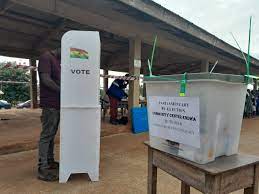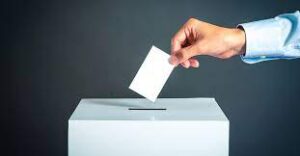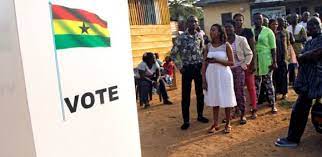The term “by-election” should be familiar in Ghana, as recently a number of constituencies: Kumawu, Assin North and Ejisu exercised their franchise to electing members of parliament.
The two words “by” and “buy” echo the same sound when pronounced but certainly have different meanings. However, in the context of Ghanaian politics, the two words can be used interchangeably to denote the meaning of the latter.
From some media reports on all the by-elections held in Kumawu, Assin North and Ejisu constituencies, one can deduce that there were a considerable amount of “buying and selling” of votes by politicians before, during and after the elections.
Arguably, this is not new because it allegedly happens most times, even in the General Elections or their equivalent, “Generated elections,” over the years.
Democracy, as Abraham Lincoln defines it, is a “government of the people, by the people, and for the people.” However, how it stands and is practiced in Ghana seems to have a seemingly different outlook in meaning. If you delve deep into the intricacies of what goes into most political campaigns, you might rather refer to it as “monicracy.”

Certainly, distributing motorbikes, foodstuff, money, paying outstanding debts, sudden availability of jobs, sudden increases in salaries, road repairs, groundbreaking ceremonies for long-delayed projects, and sudden friendliness towards voters who have been previously alienated—all during election time—could have no other interpretation but the buying of elections.
This attitude deviates from the true meaning of democracy. When democracy loses its essence and value, when the rewards or benefits serve individual gains or self-aggrandizement, it defeats its purpose.
We are currently operating within a political system where the government or political parties only actively engage with the rest of Ghanaians when they are seeking either election or reelection. These are the moments when Municipal, Metropolitan and District Chief Executives (MMDCEs), Ministers, Members of Parliament (MPs) and other government officials, surrounded by bodyguards (police and soldiers), whom you had to queue for days to meet in their offices or whom it was previously very difficult to reach on the phone, suddenly become available and accessible. They can now dance with us, pound fufu, cook banku in our homes, attend the same church functions, and even attend our funerals to console us.
The same government that claimed to lack funds for road repairs, job creation, and paying workers suddenly finds resources to fulfill these obligations, playing on the emotions of citizens in the quest for votes and power during campaign and election years.
Politics is often portrayed as a dirty game played by politicians on “innocent citizens,” but I beg to differ. Are some of the citizenry truly innocent, or are they simply naive and passive?
In my opinion, many Ghanaian voters are largely to blame due to their selfish or greedy desire for unearned money. It is often said that “when you blame the cat, blame the rat too”. As much as we blame politicians, Ghanaian voters should also bear responsibility.
By their actions, it can be deduced that many politicians and voters do not have the country’s best interests at heart. Most Ghanaian voters believe politicians are solely responsible for solving all their life problems. When there are funerals, weddings, birthdays, naming ceremonies, or church harvests, the “Honorable” must contribute. Even a small donation, just like any other person, could secure their seat in the next election.
These practices create opportunities for bribery, corruption, and a “loot and share” mentality in the country. Some of these favors gotten from politicians barricades our conscience, lips and of course the truth from constructively challenging them when things are amidst in the country. Bishops, Priests, pastors chiefs and other opinion leaders have become politically exposed or aligned, and can only but speak at their comfort zones; most politician will move at any lengths to maintain their seats, regardless of the cost.
Another significant shortcoming of many Ghanaian voters is their lack of discernment. Probably, former President John Mahama was not wrong after all, when he alluded that “Ghanaians have short memories” . Most development in the country are showcased during election years. It is around this time we hear some fabricated evaluations and reports on job and factories, thousands of hospitals, clinics and schools that have been created and built in the country. Sometimes, one wonders if they are speaking about a different country call Ghana.
Certainly, by this, politicians makes us believe that if some of these developments were actually done in the course of time, we would forget and may not vote for them, so they “blindfold our minds” with some few trashy-work while campaigning at the same time. This I guess is meant to keep things fresh in our minds, as we prepare to vote for them, regardless of the physical and psychological trauma citizens go through on our bad roads, joblessness, poor hospital facilities and confusing school systems.
Every election year, we witness the same recycled stories being thrown back at us, and yet we allow ourselves to be swayed by these politicians. We fail to evaluate their performance after winning the last elections—whether they fulfilled a significant portion of their promises or not—and base our next decision on their performance.
The key to voting in a responsible, informed, and accountable government lies in understanding the policies of the different parties, which is crucial to warding off manipulation and resisting being bought off.
There is a saying that, words that do not match actions is called manipulation and refusing to be held accountable for it is called gaslighting.

A true politician is one who listens, makes realistic promises, and doesn’t indulge in idealistic rhetoric. They are not the ones who promise to move the sea from the southern part of Ghana to the northern part. A realistic politician prioritizes principles over party affiliation. They are individuals whose actions speak louder than their words, who are ready to admit their faults at any time and don’t hide the truth, regardless of the cost. A true politician is a team player and above all, humble.
My one hundred and million cedi question is, why is it so difficult for a country like Ghana and for that matter most African countries to have a National Agenda? I find it rather absurd for any political party that wants power, to dictate what a whole country needs. This in my estimation is not democracy but rather “pure babysitting”, where the “babysitter” decides what the baby needs or will eat; where the baby has no option but eat what is set before him or her.
Again , this in my opinion is not participatory and fair, if we actually want to stand by the true meaning of democracy. Today “Party Kawukawu of the People” (PKP) wants to built a tent, tomorrow “Party Borkorborkor of the Nation” (PBN) wants to sell plantains chips to us. Is that what we really want? These are people who do not have the nation at heart but are cannily interested in placing their party into power.
The country, through a proper wide consultations among the citizens should be setting the National Agenda, where political parties weave their manifesto around it, showcasing how they would rather execute those agendas. This, from my standpoint will drastically reduce if not eradicate a lot of malpractices such as manipulation of voters when it comes to elections. This, I believe, will give people the insight to vote base on realistic ideas, which will enhance true, fair and concrete development in the country. It will stop the syndromes of abandoning (capital intensive) projects that were initiated by previous government, it will stamp out self-praise of political parties, who for most part do shoddy work with tax payers’ money. At least, citizens will be able to picture where the country is heading to, the nation will be place above any political party, it will erode “tribal-political dynasties” that are slowly becoming the order of the system in Ghana and finally, it will help citizens to evaluate the government of the day and even the opposition party campaigning to come into power.
Take any serious institution or country in the world, there are laid out achievable goals and agendas (slated for a number of years) which are geared towards enhancing the livelihood of their targeted group or People. A few foresighted leaders of this country and some African countries had either proposed such ideas at their time or effectively and jealously guided their reign by such agendas.
The frequent saying, “if you fail to plan, you plan to fail” should be a watchword for us.
Regions, Constituencies or District should be tasked to come up with ideas, suggestions and recommendations that will be formulated into a National Agenda. Through the National Agenda, we (as citizens) would be the ones to tell political parties what we want and they will intend tell us how they can lead us to achieve what we want for the greater good of the country; this is democracy, this is government of the people, by the people and for the people. This makes us walk together, have shared blame and success stories.
Currently, what runs in Ghana politics and in fact, most African countries is, when it gets to the election year, every political party campaigns around the country with a of litany of unrealistic projects and programs; when they get to a particular Region or constituency, they know how to arouse the plight and emotions of the people there and how to stitch that up with lose and empty promises.
Until we come together to put a National Agenda in place, we shall keep blaming one another; the poor will continue to remain poor and the rich and wicked ones will continue to dictate the pace.
Elites and well-meaning Ghanaians will keep trooping to the radio stations, TV stations and other social media outlets to exonerate their parties and candidates or have “talkfest” or debates on their party manifestos and performance.
Until Ghanaian voters, cease accepting favors from politicians for our own selfish gains and are willing to work hard for our livelihoods, basing our voting decisions on what serves society or the country as a whole, we shall continue to be “bought off like goods at a market square”.
Until we settle for a National Agenda as a nation and rather allow political parties tell us how they can achieve that when voted onto power, we shall keep spinning around, while political parties will keep the dictates “like babysitters”.
As someone said, “no matter how far and obscure your village is, the ballot box will always get there but development won’t”.
By Rev. Fr. Nicholas Nibetol Aazine, SVD
President: Inter-Congregational Justice, Peace and Integrity of Creation (JPIC)
A Catholic Religious Organization under the Conference of Major Superiors, Ghana
Email: nicholasbetol@gmail.com



